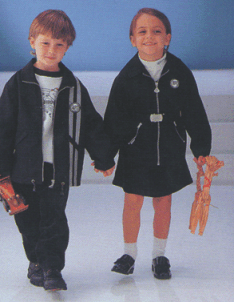Good for kids?by June Lau Mrs. Christine Chow, mother of two daughters, considers fashion for children is of equal importance as fashion for adults. “Usually I spend about $1,000 to $2,000 on children’s wear and accessories each month. Children’s brand name fashions have a better cut, design and higher quality of fabric, which avoids skin allergies. “When attending important events, my two daughters are well-dressed from head to foot,” she said. “All accessories are well-matched with one another, like handbags, ornaments and socks."
But Mrs. Chow does not blindly pursue brand names. “Whether the clothes are special, attractive and suitable for my children are the prerequisites. Brand names are less important, and price is the last thing of concern.” To Mrs. Chow’s surprise, her daughters have developed a sense of fashion. “They choose dresses and match the accessories on their own. Sometimes, they even wonder whether a dress I chose would suit the occasion,” she said. “They advise me on the colours of clothes when we are shopping.” Perhaps as a result, Mrs. Chow is afraid that her daughters will become materialistic. “I indoctrinate them with the right concepts about fashion: dressing properly is by all means more important than wearing brand names.”
But fashion appears to be unimportant to some kids, such as Ho Kit Ying, an 8-year-old primary student. “I know nothing about the differences that brand names make, except the prices,” she said. “My mother never buys me brand name clothes and I never envy my classmates who are nicely dressed,” she said. “She also tells me it is hard for her to earn money and we should spend money carefully.” Although her mother scarcely consults her when buying her clothes, Kit Ying never complains.
One mother insists that children do not need brand names. “Children should wear clothes that suit their style. I always choose clothes which make my son look smart.” As a fashion sales supervisor, she believes that one of the functions of fashion is confidence enhancement. The same applies to children. “Proper dressing enhances the confidence of my son in front of his friends. He wears a smile of confidence when putting on nice suits.” Dr. Patrick Leung, associate professor of psychology at The Chinese University of Hong Kong, considers overemphasis on brand name fashions a social problem. Said he: “Children will take a luxurious life for granted. They might not think about how hard money is earned by their parents. “When they grow up, they will demand more luxuries, which is an unlimited pursuit.” According to Prof. Leung, the situation will be even worse when children find that their abilities will never fulfil their aspirations for luxuries. He warns parents not to teach children that good taste is associated with brand names. “Children can’t tell the difference between clothes with and without brand names,” he said, “but parents can.” He said when children find it difficult to meet the unlimited material pursuits, they may attempt to achieve their objectives “by hook or by crook”. He advises family education with a stress on the importance of human
nature and traditional virtues, which can neutralize the brand name effects and the
adverse effects on society. Photos Courtesy of Hipofant |


